Unit 1 Past and Present Period 3 课件 (共27张PPT)
文档属性
| 名称 | Unit 1 Past and Present Period 3 课件 (共27张PPT) |
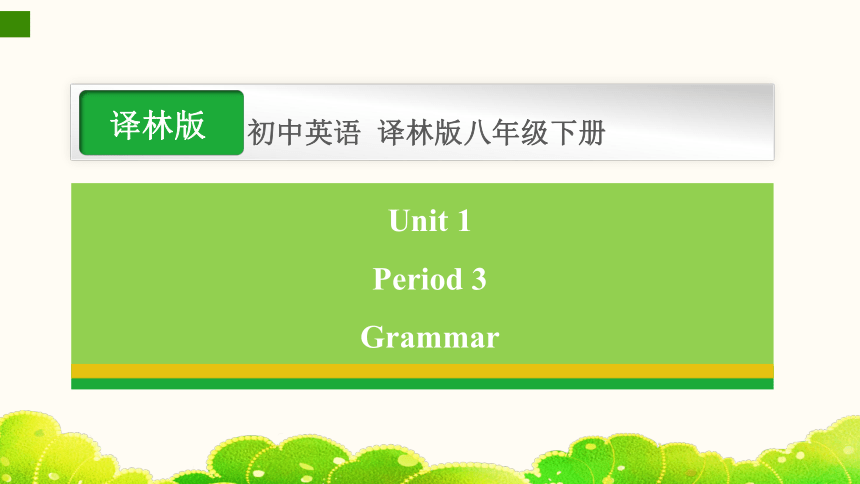
|
|
| 格式 | pptx | ||
| 文件大小 | 62.8MB | ||
| 资源类型 | 教案 | ||
| 版本资源 | 牛津译林版 | ||
| 科目 | 英语 | ||
| 更新时间 | 2024-01-03 17:33:56 | ||
图片预览

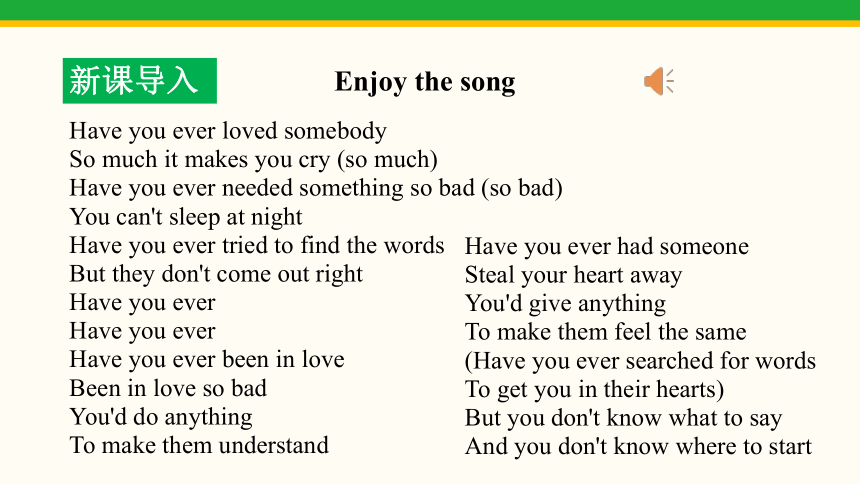
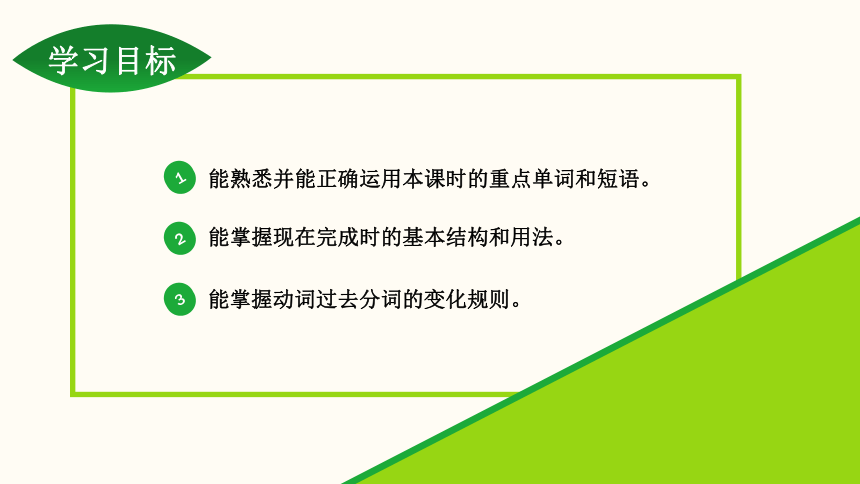

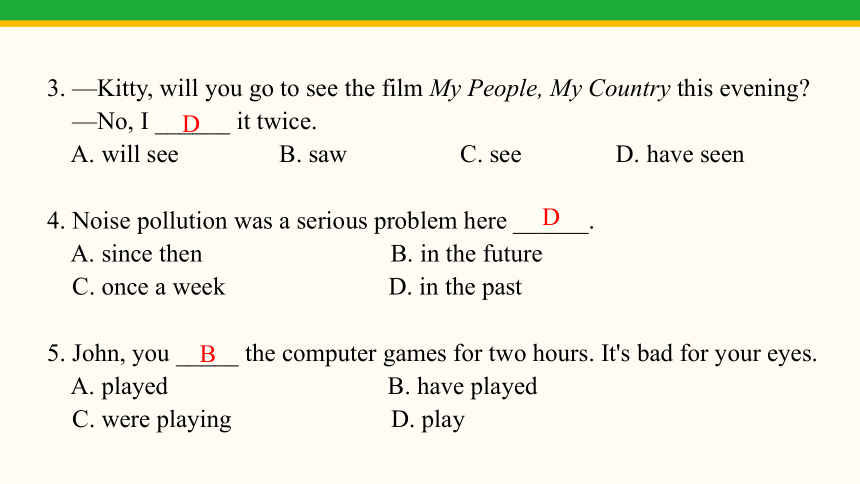
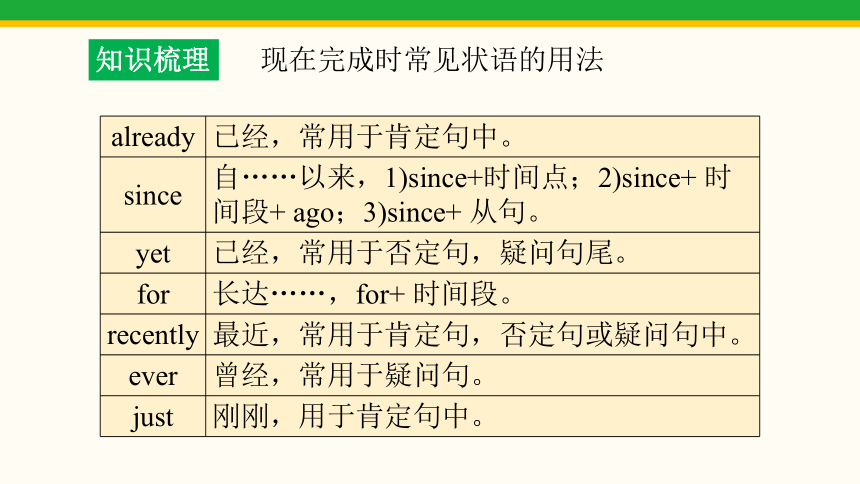
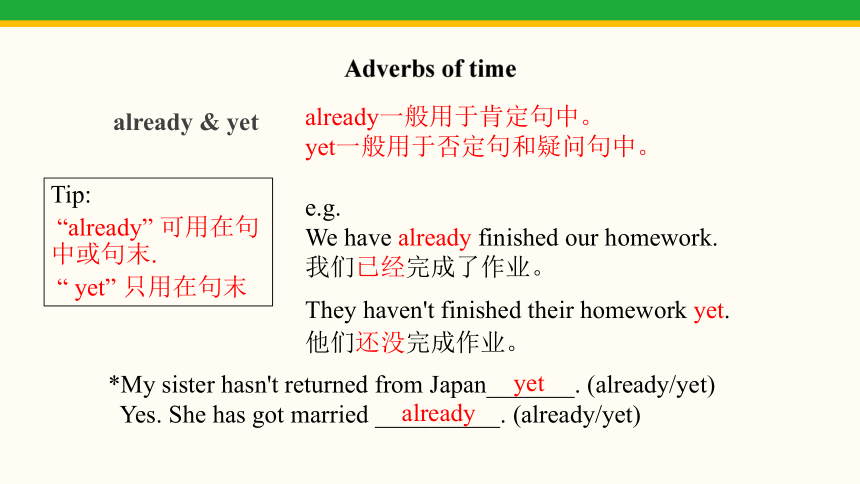
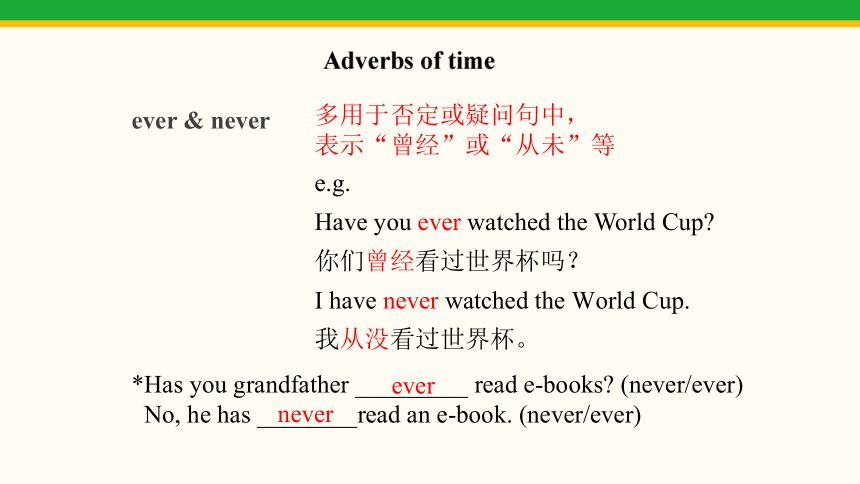
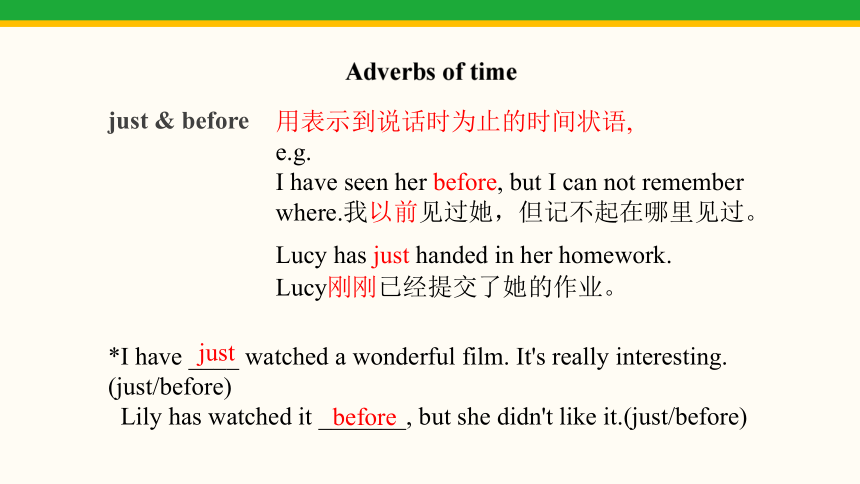
文档简介
(共27张PPT)
译林版
初中英语 译林版八年级下册
Unit 1
Period 3
Grammar
新课导入
Enjoy the song
Have you ever loved somebody
So much it makes you cry (so much)
Have you ever needed something so bad (so bad)
You can't sleep at night
Have you ever tried to find the words
But they don't come out right
Have you ever
Have you ever
Have you ever been in love
Been in love so bad
You'd do anything
To make them understand
Have you ever had someone
Steal your heart away
You'd give anything
To make them feel the same
(Have you ever searched for words
To get you in their hearts)
But you don't know what to say
And you don't know where to start
1
2
能熟悉并能正确运用本课时的重点单词和短语。
能掌握现在完成时的基本结构和用法。
3
能掌握动词过去分词的变化规则。
预习检测
1. —I have _________ got to the train station. What about you
—Not _________. I'm on the way to the station.
A. yet; already B. already; already
C. yet; yet D. already; yet
2. I miss Jim so much. I haven't seen him _________ I moved house.
A. for B. since C. if D. when
D
B
3. —Kitty, will you go to see the film My People, My Country this evening
—No, I ______ it twice.
A. will see B. saw C. see D. have seen
4. Noise pollution was a serious problem here ______.
A. since then B. in the future
C. once a week D. in the past
5. John, you _____ the computer games for two hours. It's bad for your eyes.
A. played B. have played
C. were playing D. play
D
D
B
知识梳理
already 已经,常用于肯定句中。
since 自……以来,1)since+时间点;2)since+ 时间段+ ago;3)since+ 从句。
yet 已经,常用于否定句,疑问句尾。
for 长达……,for+ 时间段。
recently 最近,常用于肯定句,否定句或疑问句中。
ever 曾经,常用于疑问句。
just 刚刚,用于肯定句中。
现在完成时常见状语的用法
Adverbs of time
already & yet
already一般用于肯定句中。
yet一般用于否定句和疑问句中。
e.g.
We have already finished our homework.
我们已经完成了作业。
They haven't finished their homework yet.
他们还没完成作业。
*My sister hasn't returned from Japan_______. (already/yet)
Yes. She has got married __________. (already/yet)
yet
Tip:
“already” 可用在句中或句末.
“ yet” 只用在句末
already
Adverbs of time
ever & never
多用于否定或疑问句中,
表示“曾经”或“从未”等
e.g.
Have you ever watched the World Cup 你们曾经看过世界杯吗?
I have never watched the World Cup.
我从没看过世界杯。
*Has you grandfather _________ read e-books (never/ever)
No, he has ________read an e-book. (never/ever)
never
ever
Adverbs of time
just & before
用表示到说话时为止的时间状语,
e.g.
I have seen her before, but I can not remember where.我以前见过她,但记不起在哪里见过。
Lucy has just handed in her homework.
Lucy刚刚已经提交了她的作业。
*I have ____ watched a wonderful film. It's really interesting. (just/before)
Lily has watched it _______, but she didn't like it.(just/before)
just
before
现在完成时的基本结构和用法
She has had breakfast.
她吃过早饭了。
They have been to Hong Kong once.
He has lived here for two years.
他们去过香港一次。
他已经住这两年了。
用法1:现在完成时表动作发生在过去并对现在造成影响。
(她现在不饿)
用法2:现在完成时表动作发生在过去并一直持续到现在,有可能继续持续下去。
用法3:现在完成时表到现在为止某动作发生了多少次。
现在完成时的用法
现在完成时的基本结构
结论:现在完成时的肯定句结构为
____________________________________
I have just eaten it.
You have cleaned up the window.
She/He/ has visited Beijing three times.
It has slept three hours.
1
主语 + have/ has + 过去分词 (+其他).
结论:现在完成时的否定句结构为
______________________________________
I have not just eaten it.
You have not cleaned up the window.
She/He/ has not visited Beijing three times.
It has not slept three hours.
2
主语 + have not / has not + 过去分词 (+其他).
Tip:
have not=haven't
has not=hasn't
—Have you eaten it
—No, I haven't./Yes, I have.
—Has she/he visited Beijing three times
—No, she/he hasn't./Yes, she/he has.
—Has it slept three hours
—Yes, it has./No, it hasn't.
3
结论:现在完成时的一般疑问句结构为
__________________________________
__________________________________
__________________________________
Have/Has + 主语 + 过去分词 (+其他)?
肯定回答:Yes, 主语+has/have.
否定回答:No, 主语+hasn't/haven't.
How long have you lived
What has she/he eaten for breakfast
What has the government done to part of the town centre
Where has she travelled recently
4
结论:现在完成时的特殊疑问句结构为
________________________________________
特殊疑问词+have/has+主语+过去分词 (+其他)
Mr Wu asks the students to complete the sentences below using the present perfect tense. Help them complete the sentences.
1. They _____________ (finish) their homework already.
2. John ________ never _________ (visit) China.
3. Mr Li ____________ (repair) over ten bicycles since Monday.
4. We ____________ (not see) each other for years.
5. My parents _____________ (not come) back yet.
6. Our teacher __________ (teach) us a lot about the history of China.
have finished
has visited
has repaired
haven't seen
haven't come
has taught
Millie and Sandy are talking about a film about the history of plete their conversation with the correct forms of the verbs in brackets.
Millie: ______ you _____ (see) any films recently, Sandy
Sandy: No, I haven't. What about you
Millie: I _____ (see) one last Saturday.
Sandy: What's it about
Millie: It's about the changes in Beijing over the past century. From this
film, I __________ (learn) more about Beijing's past and present.
Sandy: Oh, I think I __________ (hear) about the film. Do you plan to
see it again
Millie: Yes, I'd like to.
Have seen
saw
have learnt
have heard
活动小结
通过以上的活动,我们学习了:
现在完成时由_____________________________构成;
肯定形式为:_________________________________;
否定形式为:_________________________________;
一般疑问句形式为______________________________;
特殊疑问句形式为
______________________________________________。
当堂检测见DCF课件
have/has + 动词过去分词形式
主语+have / has+过去分词 (+其他.)
Have / Has+主语+过去分词(+其他)
主语+have not / has not+过去分词 (+其他).
特殊疑问词+have/has+主语+过去分词 (+其他)
探究二
动词过去分词的变化规则
Free Talk
1. Try to say the rules of forming the simple past tense of regular verbs.
2. Can you think of the rules of forming the past participles of regular verbs
规则动词的过去分词的构成
1. 大多数的动词的过去分词是规则的,只需在动词后加-ed;
work→worked listen→listened
jump→jumped visit→visited
2. 在以-e结尾的动词后只加-d;
close→closed like→liked
agree→agreed move→moved
3. 在以辅音字母加y结尾的动词,应将y改为i再加ed;
study→studied carry→carried
try→tried worry→worried
4. 以重读闭音节结尾的动词,要双写末尾的辅音字母再加-ed;
stop→stopped drop→dropped
不规则动词的过去分词的构成
1. 有些动词的原形和过去分词相同;
put→put hurt→hurt become→become run→run
2. 改变单词中的元音字母;
sit→sat win→won hold→held
3. 改变单词中的辅音字母;
lend→lent spend→spent send→sent
4. 改变单词中的元音字母和辅音字母;
keep→kept sleep→slept teach→taught
catch →caught buy→bought
5. 其他;
say→said pay→paid give→given eat→eaten
Regular verbs Irregular verbs
Base form Past participle Base form Past participle
visit visited hit hit
repair repaired put put
live lived meet met
move moved make made
try tried sell sold
study studied give given
fit fitted write written
plan planned think thought
动词的过去分词
Mr Wu wants the students to practise using the present perfect tense. Help them write the past participles of the verbs below.
1 borrow _______
2 hope ______
3 make ______
4 get ______
9 say ______
10 grow ______
11 hit ______
12 enjoy ______
5 plan _______
6 cry _______
7 send _______
8 watch _______
borrowed
hoped
made
got
planned
cried
sent
watched
said
grown
hit
enjoyed
活动小结
通过以上的活动,我们学习了:
动词过去分词的变化规则:
1.大多数词后加_____;
2.以字母e的词后加_____;
3.以一个辅音字母结尾的重读闭音节,双
写最后一个辅音字母再加_____;
4.以辅音字母+y结尾的词,将y改为__,再加____。
当堂检测见DCF课件
ed
d
ed
i
ed
当堂检测
一、根据句意及提示完成下列句子。
1. How long has Mr Smith ________ (teach) English so far
2. No country has made such great progress as Chinese in
the _________ (过去的) thirty years.
3. I have only started to learn French _________ (近来).
4. —Has the train arrived _________ (还,仍)
—Yes, it arrived ten minutes ago.
5. We have not __________ (complete) the project.
taught
past
recently
yet
completed
二、用现在完成时态完成下面的句子。
1. He _____________ (not finished) his homework yet.
2. _______ you ever _______ (be) to Beijing
3. We _______ never _______ (see) such an exciting match before.
4. Mother _________ just __________ (clean) the house. Please don't
come in.
5. They _____________ (practice) this dialogue twice.
has not finished
Have
been
have
seen
has
cleaned
have practiced
重点单词:
yet, recently, past
现在完成时的基本构成和用法:
现在完成时的动词构成:____________________;
动词过去分词的变化规则:
1.大多数词后加_____;
2.以字母e的词后加_____;
3.以一个辅音字母结尾的重读闭音节,双写最后
一个辅音字母再加_____;
4.以辅音字母+y结尾的词,将y改为__,再加____。
Unit 1
Period 3
have/has + 动词的过去分词
ed
d
ed
i
ed
译林版
初中英语 译林版八年级下册
Unit 1
Period 3
Grammar
新课导入
Enjoy the song
Have you ever loved somebody
So much it makes you cry (so much)
Have you ever needed something so bad (so bad)
You can't sleep at night
Have you ever tried to find the words
But they don't come out right
Have you ever
Have you ever
Have you ever been in love
Been in love so bad
You'd do anything
To make them understand
Have you ever had someone
Steal your heart away
You'd give anything
To make them feel the same
(Have you ever searched for words
To get you in their hearts)
But you don't know what to say
And you don't know where to start
1
2
能熟悉并能正确运用本课时的重点单词和短语。
能掌握现在完成时的基本结构和用法。
3
能掌握动词过去分词的变化规则。
预习检测
1. —I have _________ got to the train station. What about you
—Not _________. I'm on the way to the station.
A. yet; already B. already; already
C. yet; yet D. already; yet
2. I miss Jim so much. I haven't seen him _________ I moved house.
A. for B. since C. if D. when
D
B
3. —Kitty, will you go to see the film My People, My Country this evening
—No, I ______ it twice.
A. will see B. saw C. see D. have seen
4. Noise pollution was a serious problem here ______.
A. since then B. in the future
C. once a week D. in the past
5. John, you _____ the computer games for two hours. It's bad for your eyes.
A. played B. have played
C. were playing D. play
D
D
B
知识梳理
already 已经,常用于肯定句中。
since 自……以来,1)since+时间点;2)since+ 时间段+ ago;3)since+ 从句。
yet 已经,常用于否定句,疑问句尾。
for 长达……,for+ 时间段。
recently 最近,常用于肯定句,否定句或疑问句中。
ever 曾经,常用于疑问句。
just 刚刚,用于肯定句中。
现在完成时常见状语的用法
Adverbs of time
already & yet
already一般用于肯定句中。
yet一般用于否定句和疑问句中。
e.g.
We have already finished our homework.
我们已经完成了作业。
They haven't finished their homework yet.
他们还没完成作业。
*My sister hasn't returned from Japan_______. (already/yet)
Yes. She has got married __________. (already/yet)
yet
Tip:
“already” 可用在句中或句末.
“ yet” 只用在句末
already
Adverbs of time
ever & never
多用于否定或疑问句中,
表示“曾经”或“从未”等
e.g.
Have you ever watched the World Cup 你们曾经看过世界杯吗?
I have never watched the World Cup.
我从没看过世界杯。
*Has you grandfather _________ read e-books (never/ever)
No, he has ________read an e-book. (never/ever)
never
ever
Adverbs of time
just & before
用表示到说话时为止的时间状语,
e.g.
I have seen her before, but I can not remember where.我以前见过她,但记不起在哪里见过。
Lucy has just handed in her homework.
Lucy刚刚已经提交了她的作业。
*I have ____ watched a wonderful film. It's really interesting. (just/before)
Lily has watched it _______, but she didn't like it.(just/before)
just
before
现在完成时的基本结构和用法
She has had breakfast.
她吃过早饭了。
They have been to Hong Kong once.
He has lived here for two years.
他们去过香港一次。
他已经住这两年了。
用法1:现在完成时表动作发生在过去并对现在造成影响。
(她现在不饿)
用法2:现在完成时表动作发生在过去并一直持续到现在,有可能继续持续下去。
用法3:现在完成时表到现在为止某动作发生了多少次。
现在完成时的用法
现在完成时的基本结构
结论:现在完成时的肯定句结构为
____________________________________
I have just eaten it.
You have cleaned up the window.
She/He/ has visited Beijing three times.
It has slept three hours.
1
主语 + have/ has + 过去分词 (+其他).
结论:现在完成时的否定句结构为
______________________________________
I have not just eaten it.
You have not cleaned up the window.
She/He/ has not visited Beijing three times.
It has not slept three hours.
2
主语 + have not / has not + 过去分词 (+其他).
Tip:
have not=haven't
has not=hasn't
—Have you eaten it
—No, I haven't./Yes, I have.
—Has she/he visited Beijing three times
—No, she/he hasn't./Yes, she/he has.
—Has it slept three hours
—Yes, it has./No, it hasn't.
3
结论:现在完成时的一般疑问句结构为
__________________________________
__________________________________
__________________________________
Have/Has + 主语 + 过去分词 (+其他)?
肯定回答:Yes, 主语+has/have.
否定回答:No, 主语+hasn't/haven't.
How long have you lived
What has she/he eaten for breakfast
What has the government done to part of the town centre
Where has she travelled recently
4
结论:现在完成时的特殊疑问句结构为
________________________________________
特殊疑问词+have/has+主语+过去分词 (+其他)
Mr Wu asks the students to complete the sentences below using the present perfect tense. Help them complete the sentences.
1. They _____________ (finish) their homework already.
2. John ________ never _________ (visit) China.
3. Mr Li ____________ (repair) over ten bicycles since Monday.
4. We ____________ (not see) each other for years.
5. My parents _____________ (not come) back yet.
6. Our teacher __________ (teach) us a lot about the history of China.
have finished
has visited
has repaired
haven't seen
haven't come
has taught
Millie and Sandy are talking about a film about the history of plete their conversation with the correct forms of the verbs in brackets.
Millie: ______ you _____ (see) any films recently, Sandy
Sandy: No, I haven't. What about you
Millie: I _____ (see) one last Saturday.
Sandy: What's it about
Millie: It's about the changes in Beijing over the past century. From this
film, I __________ (learn) more about Beijing's past and present.
Sandy: Oh, I think I __________ (hear) about the film. Do you plan to
see it again
Millie: Yes, I'd like to.
Have seen
saw
have learnt
have heard
活动小结
通过以上的活动,我们学习了:
现在完成时由_____________________________构成;
肯定形式为:_________________________________;
否定形式为:_________________________________;
一般疑问句形式为______________________________;
特殊疑问句形式为
______________________________________________。
当堂检测见DCF课件
have/has + 动词过去分词形式
主语+have / has+过去分词 (+其他.)
Have / Has+主语+过去分词(+其他)
主语+have not / has not+过去分词 (+其他).
特殊疑问词+have/has+主语+过去分词 (+其他)
探究二
动词过去分词的变化规则
Free Talk
1. Try to say the rules of forming the simple past tense of regular verbs.
2. Can you think of the rules of forming the past participles of regular verbs
规则动词的过去分词的构成
1. 大多数的动词的过去分词是规则的,只需在动词后加-ed;
work→worked listen→listened
jump→jumped visit→visited
2. 在以-e结尾的动词后只加-d;
close→closed like→liked
agree→agreed move→moved
3. 在以辅音字母加y结尾的动词,应将y改为i再加ed;
study→studied carry→carried
try→tried worry→worried
4. 以重读闭音节结尾的动词,要双写末尾的辅音字母再加-ed;
stop→stopped drop→dropped
不规则动词的过去分词的构成
1. 有些动词的原形和过去分词相同;
put→put hurt→hurt become→become run→run
2. 改变单词中的元音字母;
sit→sat win→won hold→held
3. 改变单词中的辅音字母;
lend→lent spend→spent send→sent
4. 改变单词中的元音字母和辅音字母;
keep→kept sleep→slept teach→taught
catch →caught buy→bought
5. 其他;
say→said pay→paid give→given eat→eaten
Regular verbs Irregular verbs
Base form Past participle Base form Past participle
visit visited hit hit
repair repaired put put
live lived meet met
move moved make made
try tried sell sold
study studied give given
fit fitted write written
plan planned think thought
动词的过去分词
Mr Wu wants the students to practise using the present perfect tense. Help them write the past participles of the verbs below.
1 borrow _______
2 hope ______
3 make ______
4 get ______
9 say ______
10 grow ______
11 hit ______
12 enjoy ______
5 plan _______
6 cry _______
7 send _______
8 watch _______
borrowed
hoped
made
got
planned
cried
sent
watched
said
grown
hit
enjoyed
活动小结
通过以上的活动,我们学习了:
动词过去分词的变化规则:
1.大多数词后加_____;
2.以字母e的词后加_____;
3.以一个辅音字母结尾的重读闭音节,双
写最后一个辅音字母再加_____;
4.以辅音字母+y结尾的词,将y改为__,再加____。
当堂检测见DCF课件
ed
d
ed
i
ed
当堂检测
一、根据句意及提示完成下列句子。
1. How long has Mr Smith ________ (teach) English so far
2. No country has made such great progress as Chinese in
the _________ (过去的) thirty years.
3. I have only started to learn French _________ (近来).
4. —Has the train arrived _________ (还,仍)
—Yes, it arrived ten minutes ago.
5. We have not __________ (complete) the project.
taught
past
recently
yet
completed
二、用现在完成时态完成下面的句子。
1. He _____________ (not finished) his homework yet.
2. _______ you ever _______ (be) to Beijing
3. We _______ never _______ (see) such an exciting match before.
4. Mother _________ just __________ (clean) the house. Please don't
come in.
5. They _____________ (practice) this dialogue twice.
has not finished
Have
been
have
seen
has
cleaned
have practiced
重点单词:
yet, recently, past
现在完成时的基本构成和用法:
现在完成时的动词构成:____________________;
动词过去分词的变化规则:
1.大多数词后加_____;
2.以字母e的词后加_____;
3.以一个辅音字母结尾的重读闭音节,双写最后
一个辅音字母再加_____;
4.以辅音字母+y结尾的词,将y改为__,再加____。
Unit 1
Period 3
have/has + 动词的过去分词
ed
d
ed
i
ed
